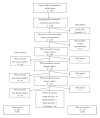Barriers and facilitators for utilization of genetic counseling and risk assessment services in young female breast cancer survivors
- PMID: 23150731
- PMCID: PMC3485517
- DOI: 10.1155/2012/298745
Barriers and facilitators for utilization of genetic counseling and risk assessment services in young female breast cancer survivors
Abstract
Introduction. Women diagnosed with breast cancer at a young age are more likely to carry a cancer predisposing genetic mutation. Per the current NCCN recommendations, women diagnosed under age 50 should be referred to cancer genetic counseling for further risk evaluation. This study seeks to assess patient-reported barriers and facilitators to receiving genetic counseling and risk assessment among a community-based population of young breast cancer survivors (YBCS). Methods. Through the Michigan Cancer Surveillance Program, a state-based cancer registry, 488 women diagnosed with breast cancer before age 50 in 2006-2007 were identified. They received a mail survey regarding family history and facilitators and barriers to receiving genetic counseling and risk assessment. Results. Responses were received from 289 women (59.2%). One hundred twenty-two (42.2%) reported having received cancer genetic counseling. The most frequent reason identified for receiving services was to benefit their family's future. The top reasons for not attending were "no one recommended it" and "medical insurance coverage issues." Discussion. This study is the first published report using a state cancer registry to determine facilitators and barriers to receiving genetic counseling and risk assessment among YBCS. These findings demonstrate the need for additional awareness and education about appropriate indications for genetic services.
Figures
References
-
- Ruddy KJ, Gelber S, Shin J, et al. Genetic testing in young women with breast cancer: results from a Web-based survey. Annals of Oncology. 2009;21(4):741–747. - PubMed
-
- US Preventive Services Task Force. Genetic risk assessment and BRCA mutation testing for breast and ovarian cancer susceptibility: recommendation statement. Annals of Internal Medicine. 2005;143(5):355–361. - PubMed
-
- National Comprehensive Cancer Network Clinical Practice Guidelines in Oncology. Genetic/Familial High-Risk Assessment: Breast and Ovarian. 2011, http://www.nccn.org/index.asp.
-
- Centers for Disease Control and Prevention Division of Cancer Prevention and Control. 2012, http://www.cdc.gov/cancer/dcpc/about/
-
- Miedema B, Easley J. Barriers to rehabilitative care for young breast cancer survivors: a qualitative understanding. Supportive Care in Cancer. 2011:1–9. - PubMed
Grants and funding
LinkOut - more resources
Full Text Sources



